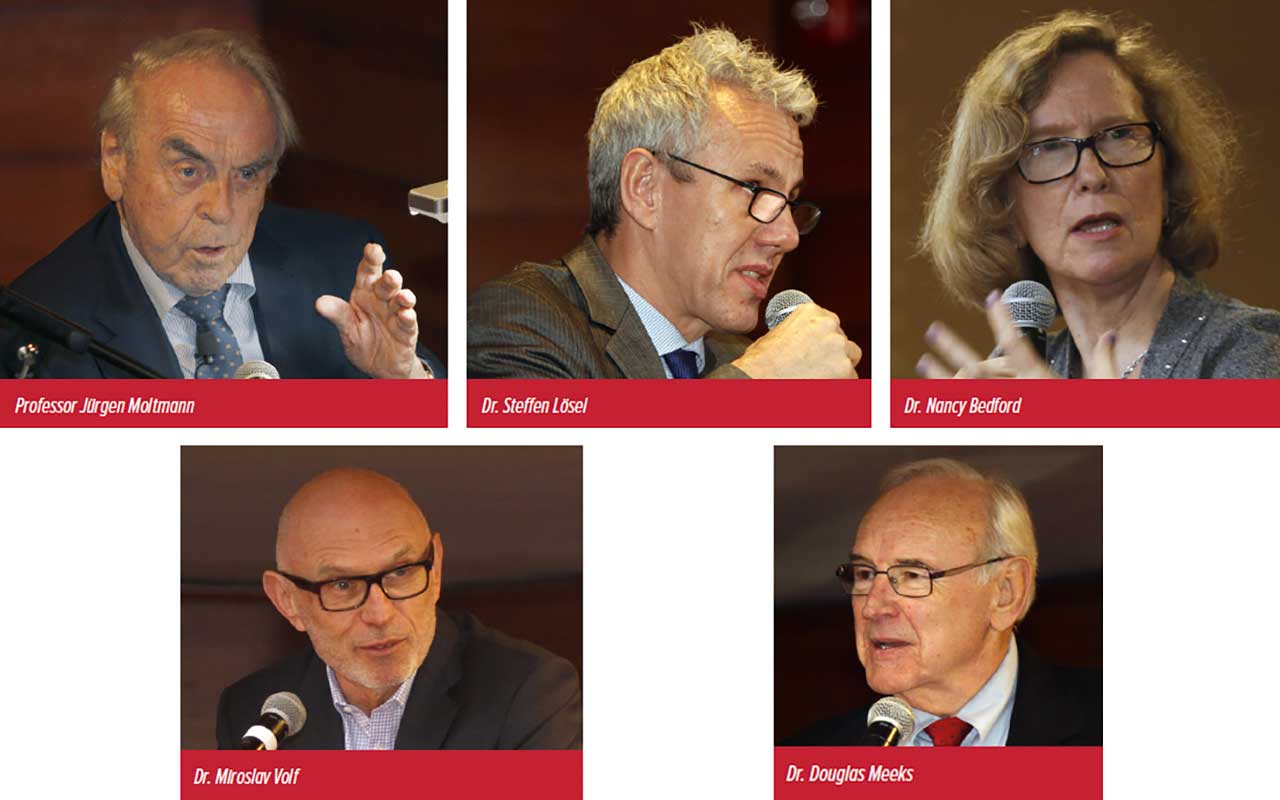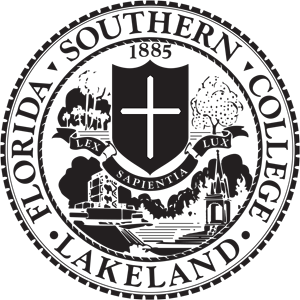
Former Students Join Guest Lecturer Defining the Future of Theology
Feb 8, 2018

In a landmark event not only for Florida Southern but in contemporary theological studies, the distinguished theologian Jürgen Moltmann and four of his former students who have become eminent scholars gathered in November for a two-day series of lectures on the subject “The Future of Christian Theology.”
Dr. Moltmann, emeritus professor of systematic theology at the University of Tübingen, Germany, is widely considered the most influential living Christian theologian. He was joined at the conference by Dr. Nancy Bedford, Georgia Harkness Professor of Applied Theology at Garrett-Evangelical Theological Seminary in Evanston, Ill.; Dr. Steffen Lösel, associate professor of systematic theology at Candler School of Theology, Emory University; Dr. Douglas Meeks, Cal Turner Chancellor Professor of Theology and Wesleyan Studies Emeritus at the Divinity School, Vanderbilt University; and Dr. Miroslav Volf, Henry B. Wright Professor of Systematic Theology at Yale University Divinity School and founding director of the Yale Center for Faith and Culture.
The five theologians were brought to FSC for the 2017–2018 Warren W. Willis Lecture in Religion, which this year was held jointly with the inaugural P.M. and Mary Boyd Lecture in Evangelism. The Rev. Dr. Boyd ’35 was a longtime pastor and district superintendent in the Florida United Methodist Conference, who also served as chaplain at FSC and was a College Trustee from 1953 to 1961.
The event marked the third time Dr. Moltmann has participated in the Willis Lecture, including last year, when the College conferred upon him an honorary doctor of divinity.
According to Dr. Waite Willis, Pendergrass Professor of Religion and chairman of the Department of Religion and Philosophy at FSC, the subject of the conference emerged from Dr. Moltmann’s writings.
“One of his most important concepts is hope and Christian eschatology—the study of last things. Something is in the air these days, and we wanted these scholars to address the question of where theology is going,” he said.
In the keynote lecture, Dr. Moltmann said theology historically has been a product of the church, the academy, and public discourse, but trends within the discipline — and outside pressures — had threatened its cohesiveness and identity.
“Christian theology must hold the triangle together,” he said.
In his conclusion, he returned to the theme of hope and said that future theology must speak of the coming of God into human life.
“Christian hope is not only hope for eternity, but hope for our future on the earth and even of the earth,” he said. “Hope stands against the arrogance of the powerful and the apathy of the powerless.”
In perhaps the boldest moment of the conference, Dr. Volf expressed his frustration with the current state of theology, which he said has become “irrelevant, uninteresting, and limited to niche groups.” In the face of the ascendance of science, he said, theology has adopted a “self-marginalizing, self-defeating attitude.”
“We should dare to believe God’s home and our journey to it is the highest good. What kind of life, what kind of world is worthy of human desire?” he asked.
Dr. Moltmann, emeritus professor of systematic theology at the University of Tübingen, Germany, is widely considered the most influential living Christian theologian. He was joined at the conference by Dr. Nancy Bedford, Georgia Harkness Professor of Applied Theology at Garrett-Evangelical Theological Seminary in Evanston, Ill.; Dr. Steffen Lösel, associate professor of systematic theology at Candler School of Theology, Emory University; Dr. Douglas Meeks, Cal Turner Chancellor Professor of Theology and Wesleyan Studies Emeritus at the Divinity School, Vanderbilt University; and Dr. Miroslav Volf, Henry B. Wright Professor of Systematic Theology at Yale University Divinity School and founding director of the Yale Center for Faith and Culture.
The five theologians were brought to FSC for the 2017–2018 Warren W. Willis Lecture in Religion, which this year was held jointly with the inaugural P.M. and Mary Boyd Lecture in Evangelism. The Rev. Dr. Boyd ’35 was a longtime pastor and district superintendent in the Florida United Methodist Conference, who also served as chaplain at FSC and was a College Trustee from 1953 to 1961.
The event marked the third time Dr. Moltmann has participated in the Willis Lecture, including last year, when the College conferred upon him an honorary doctor of divinity.
According to Dr. Waite Willis, Pendergrass Professor of Religion and chairman of the Department of Religion and Philosophy at FSC, the subject of the conference emerged from Dr. Moltmann’s writings.
“One of his most important concepts is hope and Christian eschatology—the study of last things. Something is in the air these days, and we wanted these scholars to address the question of where theology is going,” he said.
In the keynote lecture, Dr. Moltmann said theology historically has been a product of the church, the academy, and public discourse, but trends within the discipline — and outside pressures — had threatened its cohesiveness and identity.
“Christian theology must hold the triangle together,” he said.
In his conclusion, he returned to the theme of hope and said that future theology must speak of the coming of God into human life.
“Christian hope is not only hope for eternity, but hope for our future on the earth and even of the earth,” he said. “Hope stands against the arrogance of the powerful and the apathy of the powerless.”
In perhaps the boldest moment of the conference, Dr. Volf expressed his frustration with the current state of theology, which he said has become “irrelevant, uninteresting, and limited to niche groups.” In the face of the ascendance of science, he said, theology has adopted a “self-marginalizing, self-defeating attitude.”
“We should dare to believe God’s home and our journey to it is the highest good. What kind of life, what kind of world is worthy of human desire?” he asked.